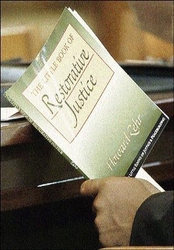Restorative justice
Published: Monday | September 7, 2009

A member of the Eastern Jamaica Conference of Seventh-day Adventists takes a quick glance at a handbook on restorative justice. A report from a commission of enquiry has pointed out that healing the deep-rooted harms and conflicts in Jamaica was needed as sometimes legal outcome was inadequate in ensuring sustainable peace and conflict resolution. - File
Karen Rodneywas involved in a dispute with a female in her community. It developed into a major fight and Rodney burned the young woman with hot water.
Rodney has admitted that she was wrong and is seeking forgiveness. However, she is uncertain whether the victim is willing to work things out.
Rodney could participate in a restorative justice (RJ) programme when it is introduced nationally. RJ focuses on healing the harm that wrongdoing causes to people. It restores relationships among all affected. Its aim is to repair the harm done to the victim and the community and help offenders assume personal responsibility.
RJ also ensures that the offender is rehabilitated and re-integrated in society.
Restorative justice processes:
Are inclusive and democratic
They bring together all those affected by the wrong and have a stake in its resolution
Allow the actual victims of crime to become the central participants in the response to crime
Challenge assumptions that seek justice through separation and alienation
Offenders are held more directly accountable for their actions and the victims' need for answers and healing are better addressed.
Are effective in reducing re-offending, and preventing crime when applied to the criminal justice system.
Why Restorative Justice for Jamaica?
RJ is being used internationally and has been effective in other jurisdictions.
The report of a commission of Enquiry pointed out that healing the deep-rooted harms and conflicts in Jamaica was needed as sometimes legal outcome was inadequate in ensuring sustainable peace and conflict resolution.
The Government of Jamaica in 2004 mandated the Ministry of Justice to develop policy to support the development of a RJ programme. The policy is currently being revised for Cabinet submission.
Restorative Justice Community Processes
Four communities have been selected to be a part of the pilot for RJ Community Processes.
They are:
Granville, St James
May Pen, Clarendon
Spanish Town, St Catherine
Tower Hill, St Andrew
The pilot is expected to last for at least 18 months and will be replicated nationally thereafter.
Twenty-three public consultations were held islandwide. Three consultations are to be held in Tower Hill this month.

How does Restorative Justice work?
Restorative justice facilitators meet separately with the offender, the victim and their support people, to assess whether a restorative justice conference would be helpful.
They usually talk with offenders first to see if they are willing to take part.
If it seems unsafe for the victims or doesn't seem likely to be positive, the facilitators may decide not to go ahead.
If the offender doesn't take responsibility, is aggressive, or cannot participate fully because of ill health or a disability, the process will not proceed.
If the victim and offender agree to meet and there is likely to be a positive outcome, the facilitators arrange a conference.
Sometimes the conference will involve members of a community panel as well as, or instead of, a direct victim.
All restorative justice staff should have had training and each restorative justice group must have a written complaints process.
You should be able to expect that all restorative justice facilitators and coordinators:
Explain the restorative justice process to you fully, and keep you informed
Encourage you to ask questions and help you to feel safe and supported.
Benefits of Restorative Justice
A change in the attitude, behaviour and perception of members of our communities
An ease on the burden on our courts
Communities assuming ownership of the legitimate delivery of justice
New sensitivity to and realisation of the impact that crime has on the community
Increasing and encouraging pro-activity by communities in delivering justice, in preventing and responding to crime and in maintaining peace
Victims being empowered
Empowerment of communities
Bringing closure to the offence and restoring trust in the justice system
Send all your questions, comments and suggestions on the justice system to editor@gleanerjm.com and the ministry of justice will respond.








